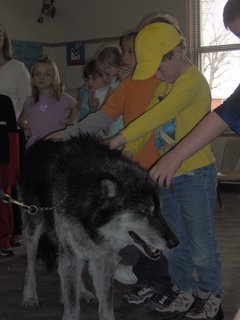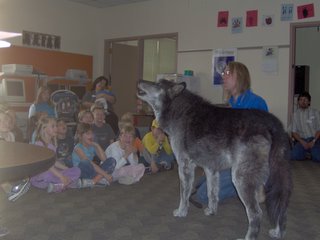Today, Jim and I met up with Jan, Dick, and Rebecca for our most recent outreach event at the grand re-opening of Petco. While Raven was a little too tired from the week's excitement to attend, Aylah and Arrow were their normal pleasant ambassador selves, and we also brought one of our sanctuary animals, Kaisa.
Kaisa is an extremely low-content wolf-dog who has spent almost her entire life at our sanctuary. After her and her littermates were born to two animals rescued from a horrible puppy-mill atmosphere, Kaisa and her brother Kireon were brought to the sanctuary and placed with an animal named Dancer. Fairly early in his life, Kireon left us, and Kaisa grew to be Dancer's mate. For the first several years, they lived happily together, and Kaisa developed into a very social, sweet girl, who loves attention. When Dancer passed away, Kaisa was left to her enclosure by herself.
Kaisa loves people, attention, and going for walks. She's very submissive to human-caretakers, and can even become shy when someone leans over her or she feels overwhelmed. She is very well-behaved on a leash, knows how to sit on command, and does not dig, climb, jump or act destructive in the slightest. Size-wise, she probably weighs roughly 60 pounds. She has beautiful almond eyes, petite features (including feet) and an adorable fluffly tail that curls slightly at the bottom. This is not a wolf-dog, and not an animal that belongs at our Sanctuary. While Kaisa has a good home here, it is not as good as she deserves. She deserves a big back yard, the size of her current enclosure, but one that is attached to a home with a family that loves her, walks her, and offers her all of the attention she could desire. She deserves the life of a normal, domestic dog. Instead of re-mating her, she has become the only animal up for adoption from the Sanctuary in many years.
Kaisa had never been indoors until last night. As we coaxed her into Jim's mother's house, she was so fearful of the new atmosphere, she dropped to the carpet and began crawling on her belly throughout the room, as though trying to find safety in being grounded. As we took her to the back porch and I sat with her, she moaned slightly, and my heart began to break in a new way for these animals.
While wolves and wolf-dogs of any content-level are terrible pets, there are some animals that are so low-content, that no wolf behavior surfaces at all. However, these animals are bred over and over again in the US, sold to buyers who are interested in owning a wolf, and then treated with the same bias that has been placed on wolves by the general population. There is such a strong surge of ego that arises in humans--particuarly Americans--to own an exotic pet, a "dangerous" guard dog, or a "spiritual-being," that wolf-dog ownership has become an epidemic. The obvious problem with this is the maturation of an animal that was never meant to be a pet. These animals are then abused, abandoned, and/or euthanized, and only a lucky few find themselves in Sanctuaries like ours. The not-so-obvious problem with this, is that sometimes, the urge and dream of these people overcomes the animal's true nature.
Each day working in administration, I receive 1-7 phone calls from people wanting to place a wolf-dog that is otherwise going to be euthanized. Most of the time, 5 of these are animals that probably have no more wolf in them than your average miniature dauchsund, or so much dog in them that they should never have been titled a "wolf-dog." I've received pictures of mixed-labradors, collies, huskeys, malamutes, german shepherds, and even Irish Wolfhounds--all animals that have virtually no (if any) wolf in them at all, that are awaiting euthanasia because someone went around calling them a wolf-dog. Sometimes it is because a normal dog behavior that could've been modified, is automatically considered to be a wolf-problem---a new scapegoat for irresponsible owners. "My wolf-dog tore up my couch!" And I can't help but think, "So did the terrier-beagle mix I had growing up."
I wanted to reach through the phone and strangle a woman from the Humane Society in Texas, recently. She had called 48 hours prior to the euthanasia of an animal they were calling a wolf-dog. I asked her to send us some pictures through email. When I received the pictures, I looked at a white dog with black spots, pointed ears with no fur, a pink nose, tiny feet, a curled wagging tail, and a coat that in the dead of winter was one-coat of thin, short fur. When questioned about the animals behavior, the woman explained that he loved people of all ages, walked well on a leash, and liked all other dogs, however he could be "very food aggressive if you try to take his food away." This was a dog. A pure dog. Perhaps one hair on the tip of his wagging tail was wolf. I asked the woman how they knew it was a wolf-dog. She said that one of the shelter people said she was, and wasn't it obvious? I told her that I, and the rest of the staff, were 99% positive that the animal had no wolf in him at all and that they should find him a good home like any other animal. She told me that his paperwork already said "wolf-dog," and that there was no turning back. This animal either had to go to a wolf Sanctuary or be euthanized.
As I sat with Kaisa, I thought of her and the few other animals we have at our Sanctuary like her. There is Greebo and Hooter, animals labled with wolf who's only indiscretion was getting too playful with a neighbor's cat. Meea, a pure dog who was sold as a wolf-dog and then found to be illegal in the state she was taken to. Artemesia, who, as a puppy "looked very wolfy." These animals have no business being at our Sanctuary. They belong in a home, just like any dog. But if they hadn't come to us when they did, they would've been euthanized.
As Kaisa crawled across the floor, my heart broke. Here is an animal who could be living the happy, social life of any dog, with a family, who has had to spend her life in a sanctuary that should be housing wolves, and because of this, she has never learned to live a normal life. Kaisa should not be crawling on her belly indoors, she should be quickly jumping off of the couch, so as not to be caught by her owners as they open the door. She should be curled up in front of a TV with a couple of kids. She should be chasing the house-cat through the kitchen. She should be sleeping at the foot of someone's bed.
With time and the encouragment of a loving owner, I'm sure that Kaisa will adjust to life as a "normal" dog. However, she will never escape the haunting title of "wolf" placed on her many years ago. If an official wanted to take her away and euthanize her, he could use the claim that he rabies vaccination hasn't been proven effective in wolf-dogs. If Kaisa were put into a situation--cornered, threatened, beaten, and she snapped in fear, leaving so much as a scratch on a person--she would have to be euthanized. If her new home for some reason left her at the humane society or some other shelter, she could not be re-adopted, she would have to be euthanized as well.
In the past year or so, Wild Spirit has decided to only accept high-content wolf-dogs and pure wolves. Low to mid-content animals can sometimes be placed in other rescues or in special circumstances, in a home. We are one of the few facilities in the nation capable of the care of a high-content or pure wolf. In the past, when there was space, any animal was accepted, and thus, animals like Kaisa, were brought to spend their life somewhere they don't belong. While we are opening our door to animals that have no where else to go, and choosing not to accept animals who would be better off somewhere else, there is no end to the ego that forces pure dogs and practically pure dogs into euthanasia. Thousands upon thousands of wolf-dogs are euthanized in the US alone every year... One has to wonder how many of these are actually dogs, stricken with a bias that should never have entered into their lives...
Kaisa, I am confident will find a good, loving home, where her new owners are understanding of these issues... Thousands of others will not. The wolf-dog epidemic goes beyond the obvious... but whether it be dogs given a death sentence because of bias, or wolves and wolf-dogs given a death-sentence because of ignorant ownership, ego, a lack of education, and irresponsibility are murdering thousands of animals every year... And while the tears I cried today are of a new pain, they are not tears that will stop anytime soon.

 affection for as long as they were interested. After his initial greeting, Grey Shadow would tumble off, and often, investigate the fecal bucket his human friend had brought in, as though it was his own personal treasure chest. This particular habit, while not necessarily appealing, was one of his most endearing traits. It was a well-known fact throughout the compound that two things made Grey Shadow happy: Food, and, well, poop.
affection for as long as they were interested. After his initial greeting, Grey Shadow would tumble off, and often, investigate the fecal bucket his human friend had brought in, as though it was his own personal treasure chest. This particular habit, while not necessarily appealing, was one of his most endearing traits. It was a well-known fact throughout the compound that two things made Grey Shadow happy: Food, and, well, poop.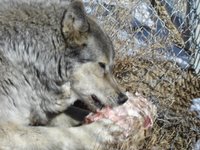
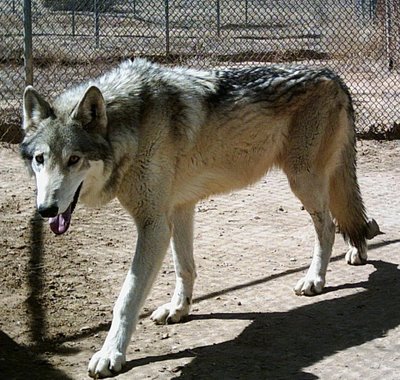
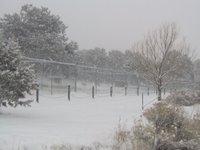


 As I close my eyes, in an attempt to save this scene forever in my mind, a single howl begins a chorus of fifty wolves that will carry through the mountains, and then become absorbed in the snow as quickly as it began.”
As I close my eyes, in an attempt to save this scene forever in my mind, a single howl begins a chorus of fifty wolves that will carry through the mountains, and then become absorbed in the snow as quickly as it began.”